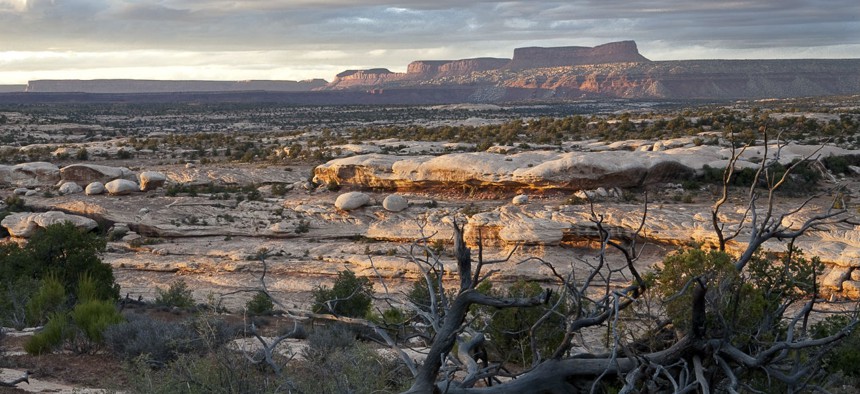
The Interior Department plans to relocate the Bureau of Land Management's headquarters to Grand Junction, Colorado, near McInnis Canyons National Conservation Area, above. BLM Photo
Tensions Rise Over Interior Department Relocations
Trump administration officials get personal with lawmakers objecting to the planned moves.
The Trump administration is butting heads with lawmakers over its effort to move an agency’s headquarters and hundreds of employees out of Washington, and the conflict has started to turn personal.
The Interior Department is moving forward with its plan to relocate about 250 Washington-based Bureau of Land Management employees to western states, including 27 who will serve at the agency’s new headquarters in Grand Junction, Colorado, despite pushback from its Democratic overseers in Congress. Lawmakers have accused Interior of failing to justify the decision and adequately include Congress, stakeholders and employees in the process.
"We are concerned the proposal is designed to reduce the bureau's effectiveness and relevance," Rep. Betty McCollum, D-Minn., who chairs the House Appropriations panel that oversees Interior, and Sen. Tom Udall, D-N.M., who serves as the ranking member on the equivalent Senate subcommittee, wrote in a letter to Interior Secretary for Land and Mineral Management Joseph Balash earlier this month. "As a result, we object to the department moving forward with the reorganization of the bureau and the relocation of its staff.”
The lawmakers accused Interior of making a “political decision” to move BLM leadership out of D.C. and “simply reverse-engineered its analysis to fit that objective.”
Administration officials have consistently defended the move as critical to saving taxpayer dollars, putting employees closer to the lands they manage, redistributing institutional knowledge throughout the bureau and fostering the development of new leadership. In response to the letter, Balash—whose last day at Interior is today—told the lawmakers the department met all of its requirements to coordinate with Congress and indicated the administration has no intention of backing off its moves. Balash further said McCollum and Udall were too late with their complaints, noting the appropriators missed a 30-day deadline included in a recent spending bill to issue an objection.
The assistant secretary went on to suggest Interior would consider not placing any of the relocated BLM employees in the lawmakers’ home states due to their objections.
“Given your apparent strong feelings about the department's actions and intentions, we pledge to review and reconsider the relocation of additional departmental resources to your state, and will reach out to those in the delegation for additional insight and information,” Balash wrote in a letter to Udall. In a similar letter to McCollum, Balash said Interior is “open to working with other delegations that objection to additional departmental resources being allocated to their states.”
Balash’s letters were first reported by E&E News.
McCollum rejected Balash’s argument, saying it was “unacceptable to circumvent Congress.”
“Unfortunately, this letter continues the pattern of this administration’s failure to recognize Congress’ role as a co-equal branch of government,” McCollum said. “It is our constitutional duty to conduct oversight and ensure appropriated taxpayer dollars are spent wisely.”
The chairwoman added she was “concerned that BLM is moving in a direction that will lead to employee attrition and uncertainty in BLM’s ability to achieve its mission and goals.”
Balash told the lawmakers that Interior anticipates three-quarters of employees will accept their relocations, while one-quarter will retire or accept positions elsewhere in Washington. BLM plans to leave 61 positions in the capital region.
BLM has also received significant pushback from conservation and other stakeholder groups. The Public Land Foundation, a group of mostly former BLM employees, voiced its opposition in a letter to lawmakers last month by suggesting it would hamper the “invaluable” role Washington-based employees play in advocating for the agency across Interior and Congress. Currently, about 96% of BLM employees work outside of the Washington area.
BLM is “going to miss out,” said George Stone, director at large for the foundation. “They’re going to be the weak link inside the department.”
While he acknowledged employees out west can arrange for phone calls and videoconferences to coordinate with D.C.-based personnel, those options do not “help to forge relationships that you do through one on one and in person.” Non-governmental groups that often coordinate with BLM’s Washington staff could see their voices go unheard, he said, while some issues that deserve objective review from Washington may now face undue influence from local interests.
Stone, who previously served as a BLM program lead in Washington, acknowledged some employees may be willing to relocate, as tours through headquarters are often viewed as a stepping stone for employees who ultimately want to go back into the field at a higher rank. Washington-based employees will no longer receive the benefit of learning from the expertise of those field staffers circling through, Stone lamented.
Earlier this month, acting White House Chief of Staff Mick Mulvaney suggested the administration was pursuing agency relocations—the Agriculture Department is also in the process of moving two components to Kansas City—as a means to slash federal jobs. Mulvaney said it was “nearly impossible” to fire federal employees, but forcing them to move “outside the bubble” and into “the real part of this country” is a good way to get them to quit.
Stone, who keeps in touch with BLM headquarters employees, said top career workers were not consulted on the move. That allegation was seconded by McCollum and Udall, who said the proposal was “deliberately created without regard to the experience and expertise of those employees.” Officials are now at a crossroads, as the agency says it has the authority and unexpired funds to move forward, while lawmakers continue to fight back and feel they can block the move through future appropriations.
“That’s part of our problem,” Stone said. “We don’t really know where things stand.”
The House Natural Resources Committee is expected to hold a hearing on BLM’s relocations early in September, shortly after returning from its current summer recess.







